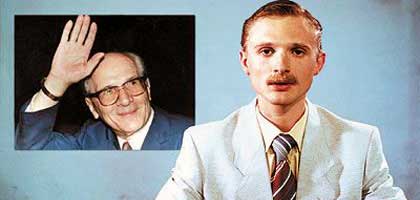
Good Bye, Lenin!
Germany 2003

Reviewed by Richard Falcon
Synopsis
Our synopses give away the plot in full, including surprise twists.
East Berlin, summer 1978. While 11-year-old Alex Kerner (Daniel Brhl) and his sister Ariane (Maria Simon) watch a television broadcast of the Soyuz 31 space mission, in which cosmonaut Sigmund J hn (Stefan Walz) becomes the first German in space, their infant-school-teacher mother Christiane (Katrin Sass) is questioned by the Stasi, who suggest her husband must have a lover in West Berlin. When he fails to return from one of his many trips there, Christiane becomes depressed. Following psychiatric treatment, she throws herself into being a loyal citizen of the GDR.
Autumn 1989. On the 40th anniversary of the GDR, Christiane sees Alex being arrested during a street protest, at which he encounters attractive young Russian nurse Lara (Chulpan Khamatova); Christiane has a heart attack. In a coma during the months in which the Wall comes down, she awakes not knowing that the GDR is no more, that Ariane works at Burger King and has a boyfriend, Rainer (Alexander Beyer), from the west, and that Alex sells satellite dishes with colleague Denis (Florian Lukas). Warned by doctors that any shock could kill Christiane, Alex restores their flat to its old decor and keeps his mother in the dark about the fall of the GDR regime. When Christiane wants to watch the television news, Alex plays her tapes of old broadcasts. When she leaves the apartment on her own, discovering a changed Berlin, Alex and Denis create their own GDR 'news reports' which explain that West Berliners are taking refuge in the east in their thousands.
Ariane tells Alex that she has seen their father when he stopped for a burger with his family. Alex visits him at his West Berlin villa and tells him that Christiane is ill. Alex buys a Trabant and drives his mother and sister to their country chalet. There, Christiane confesses that their father did not run away with another woman he asked her to defect with him, but she lacked the courage to go. The father (Burghart Klaussner) pays a visit to Christiane, who dies shortly afterwards.
Review
'Konsumterror', translated in my dictionary as "pressures of a materialistic society", was one of the ways in which the state-controlled media of the German Democratic Republic (GDR) characterised life in the capitalist 'wild' west. An intelligently playful take on this notion informs the irresistible high concept driving Wolfgang Becker's wonderful bittersweet comedy. Having been in a coma at the time of the fall of the Berlin Wall, dedicated socialist Christiane unknowingly awakes to a changed GDR. Warned by her doctors that any shock could kill her, Christiane's son Alex frantically tries to prevent her from discovering the collapse of the country whose ideals she espoused ("My mother was married to our socialist Fatherland," he explains), ensuring that everything in their standard-issue 79-square-metre apartment is a product of the now-defunct communist era. The deception after he has restored the flat to its pre-flashy-western-makeover state begins with consumer perishables. Alex rescues empty jars for Spreewald gherkins and packets for Mocca Fix Coffee from rubbish bins and fills them with the western goods that have now replaced these GDR items in East Berlin's shops. The film-makers' choice of products is telling the gherkins are a German food with heritage, reclaimed smartly by private concerns soon after reunification, while sedimented memories of East German coffee, which disappeared overnight, provide rich comic territory.
The complex desires created around branded western goods (intensified in the GDR by prohibition of, and surreptitious access to, West German TV) are enduring motifs in representing German reunification. Becker makes brilliant use of them, while also smartly attracting necessary product placement. Alex's pragmatic sister Ariane gets a job at Burger King with her cheerful West German boyfriend, but Alex's efforts, in the best tradition of well-intentioned comic deception, take on absurdist proportions as the outside world starts to intrude through massive Coca-Cola banners and advertising blimps outside the window of their flat. When Christiane demands to watch the TV news, Alex recycles old broadcasts on video, then re-edits them to explain away the evidence of her own eyes. In the movie's most surreal gag, he has one of the bulletins explain that Coca-Cola has been forced to relinquish its patent to the GDR, where it was invented.
Becker, director of the justifiably successful Life Is All You Get (an in-joke cameo by Jrgen Vogel nods to the earlier film), is expert at depicting comic insecurity and is in his element here. Good Bye, Lenin! could have remained at the level of farce and contented itself with riding the current wave of partly fetishistic 'ostalgie' among an audience who may have been children in the GDR and grown to maturity in post-unification Germany. Instead it becomes increasingly emotionally intricate without sacrificing humour or accessibility to non-German audiences. When Christiane leaves the flat and is confronted by her transformed neighbourhood, a helicopter flies past, carrying a strikingly iconic, digitally enhanced statue of Lenin, his outstretched hand appearing to reach out to her imploringly. Alex's 're-creations' of GDR Aktuelle Kamera news broadcasts become, as his voiceover tells us, depictions of East Germany as he would have liked it to be, not the "real existing socialism" of everyday experience. His bulletins describe a state living up to its professed ideals, to which thousands of West Berliners "oppressed by the daily battle for survival" would feasibly flock, tearing down the Wall in a reversal of actual events.
Alex wants his father as much as a Fatherland and he finds him in his comfortable villa in Wandsee after Ariane has bumped into him at work (when pressed by Alex about what she said to him, Ariane replies: "Thank you for choosing Burger King"). Despite the effective lightness of comic touch, though, happy endings are not on offer. The emotional core of this coming-of-age comedy is a boy's love for his mother; and both ex-DEFA star Katrin Sass as Christiane and Daniel Br hl as Alex make us believe this premise with subtle, winning performances. The revelation that Christiane chose to stay in the east rather than joining her husband in West Berlin due to a failure of nerve complicates, rather than resolves, the movie's relationships and its take on the GDR (particularly given that Christiane's devotion to the state manifests itself in constructive 'consumer critiques' of GDR goods). When Alex tells us at the end that his memories are of a land that never really existed and which is, in his mind, completely bound up with his mother, the feeling is one of personal loss, with faint echoes of regret for lost ideals. The national past has been invoked through the figure of the mother in German cinema before (Helma Sanders-Brahms' Germany Pale Mother, 1980, for example) but rarely in the context of such a witty, thought-provoking and ultimately moving tragicomedy.
Credits
- Director
- Wolfgang Becker
- Producer
- Stefan Arndt
- Screenplay
- Bernd Lichtenberg
- Director of Photography
- Martin Kukula
- Editor
- Peter R. Adam
- Production Designers
- Lothar Holler
- Shoot 2:
- Daniele Drobny
- Anina Diener
- Music/Music Arranger
- Yann Tiersen
